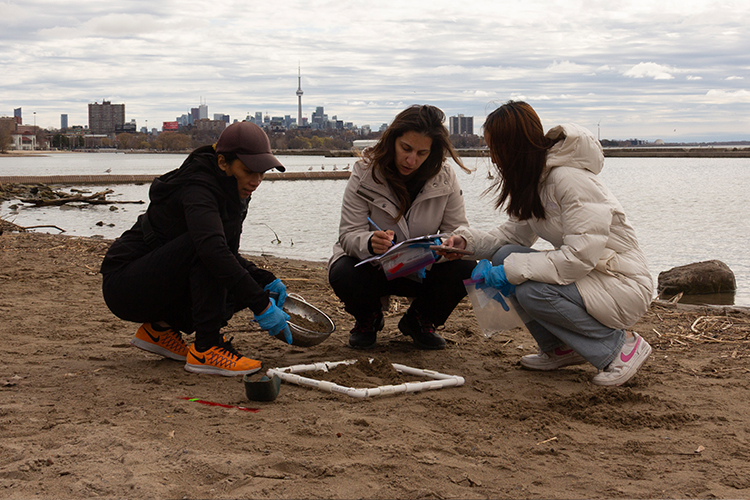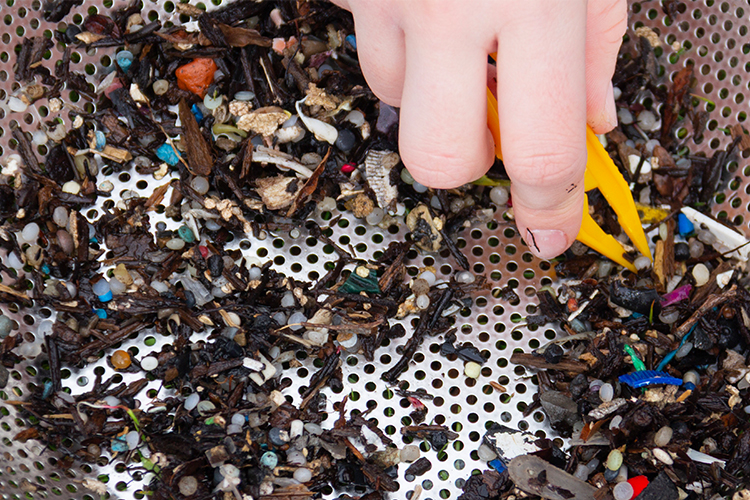To mark Earth Day in late April, Longo’s team members joined the U of T Trash Team for a team cleanup at Sir Casimir Gzowski Park Beach. The clean-up focused on collecting pre-production plastic pellets that had washed ashore from upstream industrial sources.
The U of T Trash Team — founded in 2017 in collaboration with the Rochman Lab — is increasing waste literacy in the community, piloting solutions, informing prevention and cleanup, sharing resources and inspiring independent groups to work together to tackle global plastic pollution.
“We had the idea of building a community organization to provide opportunities for these students to get out there and learn how to make an impact,” says Chelsea Rochman, an assistant professor in the Department of Ecology & Evolutionary Biology.

In addition to learning about this less familiar source of plastic pollution, Longo’s staff removed 1,725 plastic pellets. Their efforts would represent more than 600,000 pellets scaled across the full beach.
“The cleanup allows people to see the plastic problem in a different way, looking at microplastics versus straws and stir sticks and bags,” Rochman says.
The connection with Longo’s began late last year, when Longo’s stores participated in a pilot project led by the U of T Trash Team’s Pollution Prevention Project Fellow Diego Arreola Fernández.

Arreola Fernández was awarded the annual fellowship for his project, Garbage-less Groceries, which aims to reduce single-use plastics in grocery stores.
“We estimate around 2,000 single-use plastic produce bags are used in one day in one store, which, if you scale it up to all the stores in just one city, is a humongous amount of single-use plastic,” says Arreola Fernández, a fourth-year international relations and economics student at St. Michael’s College.
After receiving the fellowship, Arreola Fernández reached out to supermarkets about taking part in the project, and Longo’s jumped at the opportunity.

“Longo’s is already doing a lot in different areas of sustainability, like reducing waste, recycling and retrofitting their stores,” Arreola Fernández says. “It made sense they were genuinely passionate about this project.”
Longo’s agreed to run pilot projects in two stores to collect data on plastic produce bag usage and implement targeted interventions.
Together, Arreola Fernández and Longo’s introduced signage about the adverse impact of plastic produce bags on the environment, promoted the use of reusable produce bags and reduced the number of produce bag dispensers in the store.

“We're supportive of the work of the U of T Trash Team and the Rochman Lab,” says Sara Olivieri, a sustainability specialist at Longo’s. “Decreasing solid waste and promoting a circular economy is really important for us as grocery retailers.”
Arreola Fernández is just one of many students taking part in the important work being done by the U of T Trash Team.
His interest in environmental activism began growing up in Mexico, but continued into his studies at U of T. He says the U of T Trash Team and the Rochman Lab gave him the foundational science skills he needs to complement his activism work.

“It’s something that will stick with me for good,” Arreola Fernández says. “Any person who wants to pursue a career in policy, diplomacy or economics can benefit from understanding how they're rooted in the science.”
The U of T Trash Team has been crucial for helping students with a passion for sustainability get their feet wet in academia, nonprofits, government policy and industry to better understand their next steps after graduation.
“Being able to work across all these different sectors with the U of T Trash Team gives these students opportunities to get their foot in the door and see what it's like to work for these different stakeholders,” Rochman says. “It helps them create a network.”

Rochman has always made a point of pairing the innovative, solutions-based research being done in her lab with the action and education-oriented work taking place at the U of T Trash Team.
“Working locally, we can point to actual quantitative changes we have made,” she says. “And that feels good. Our central message is about empowerment.”
Plugging the leak: Professor Chelsea Rochman takes on plastic pollution
If you would like to support the important work being done by the U of T Trash Team or the Rochman Lab, consider making a donation to the U of T Trash Team Fund or contact Niamh Earls, Associate Director, Advancement at niamh.earls@utoronto.ca to learn more.
“Without financial support, we wouldn't be able to maintain our programs at the U of T Trash Team. It really helps keep us going and allows us to provide these opportunities for our students.” — Chelsea Rochman, Assistant Professor at the Department of Ecology & Evolutionary Biology.

